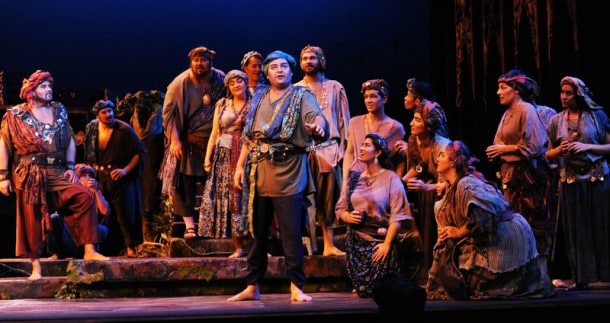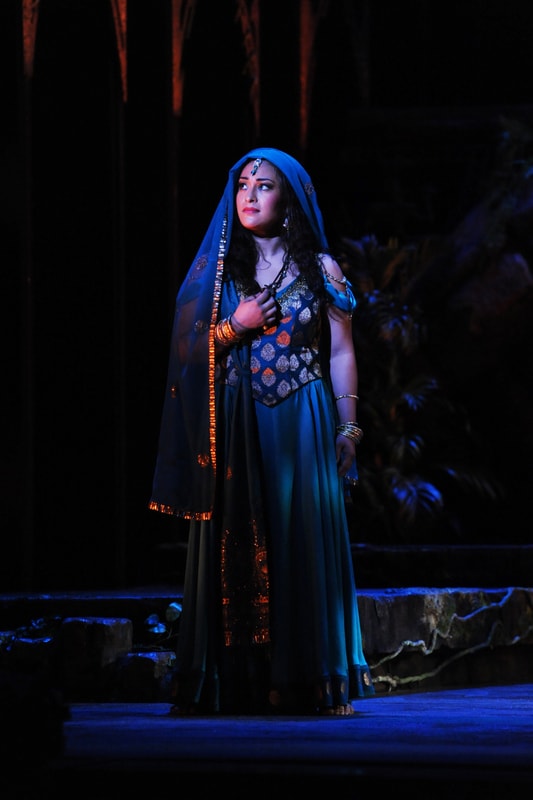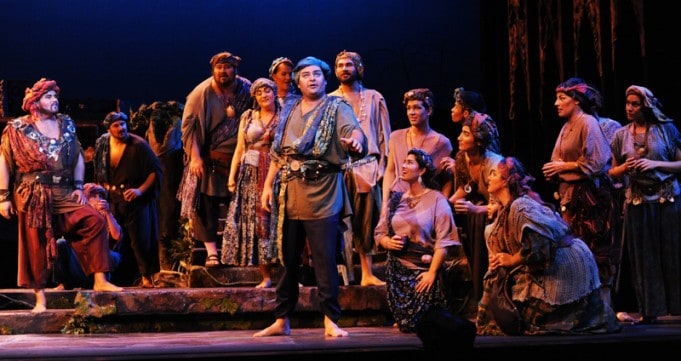
George Bizet’s The Pearl Fishers (1863) is an earlier work in the Parisian composer’s relatively short career that, despite its own merit, will undoubtedly remain forever in the shadow of his phenomenally popular final masterpiece, Carmen.
That’s a shame, however, because its many inspired duets and haunting arias are vivid illustrations of Bizet’s genius that should not be overlooked. Moreover, its economical narrative style, incorporating all of the classic, romanticized themes of forbidden passion, unrequited love, betrayal and death, provide a highly accessible and entertaining introduction to grand opera – in the French tradition.
The story, set in a fishing village in ancient Ceylon, begins with two close friends, hunter Nadir (lyric tenor Alexander Boyer) and village leader Zurga (baritone Evan Brummel), taking an eternal oath not to allow their obsessive desire for a beautiful priestess, Leila (soprano Cecilia Violetta Lopez), come to fruition and destroy their friendship.
Nadir and Zurga’s poetic duet, “Au fond du temple saint,” is the work’s most renowned piece and is a recurring melody. It highlights Boyer’s warm, mellifluous timbre and Brummel’s pure, robust resonance, each complementing the other to full musical and dramatic effect.
WATCH: Bollywood Meets Indiana Jones at Opera San Jose
Of course, things go awry and Nadir quickly succumbs to Leila’s ethereal beauty, thereby placing the emotionally devastated Zurga in the onerous position of deciding the errant couple’s fate. And, indeed, it all comes to a fatal, melodramatic conclusion. But the specific choices made by Zurga in the final moments are not only surprising but quite moving in their nobility and selflessness. Brummel’s impressive acting acumen in no small measure adds to the scene’s visceral impact.
The young and exotically good-looking Ms. Lopez makes for a convincing Leila, and her siren voice is truly enchanting. She never falters, displaying a striking vocal control and magnificent dynamic range throughout, matched only by a luminescent smile and a fiery persona that comes to life in the third act in her successive numbers with Brummel. Brava!

The production overall is professionally staged (Richard Harrell) and somewhat modest in scope, with little or no set transitions (Charlie Smith). Since events transpire very quickly, there’s no opportunity for any costume changes (Elizabeth Poindexter). But the second act does employ some spectacular sound and lighting design (Pamila Gray), and the final sequence features some strong dancing and choreography (Lise La Cour). And Opera San Jose veteran Anthony Quartuccio conducts the orchestra with appropriate vigor and finesse.
It’s an impressive debut for the company’s 29th season which, incidentally, is located at one of the most intimate and audience-friendly venues for opera in the world – San Jose’s palatial California Theatre.



